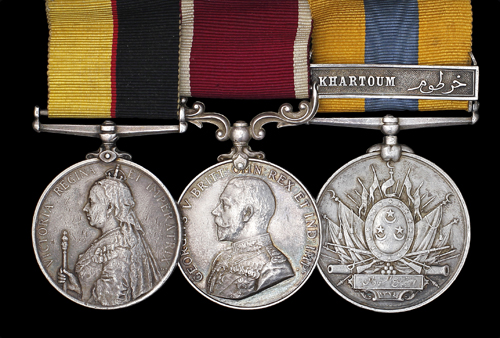
Auction: 1008 - Orders, Decorations, Campaign Medals & Militaria
Lot: 77
The Omdurman Charger´s Group of Three to Squadron Quarter Master Sergeant W.E. Walker, later W.E. Butchers, 21st Lancers, Saved From A Dervish Sword During The Charge At Omdurman By A Tin of Beef ´Strapped On My Wallet´ Queen´s Sudan 1896-98 (3597. Pte. W. Walker. 21/Lancers.); Army Long Service & G.C., G.V.R., 1st ´Field Marshal´s bust´ type (3597 Sq.Q.M.Sjt: W.E. Butchers. 21/Lrs.), last letter of surname officially corrected; Khedive´s Sudan 1896-1908, one clasp, Khartoum (3960 Lce. Corpl. W. Walker 21st. Lcrs.), contact marks, nearly very fine, mounted as originally worn, with the recipient´s 21st Lancers lapel badge; two Independent Order of Oddfellows Medals, each named to W.E. Butchers; and the following related documents &c.: - The recipient´s unsigned typed account of the Sudan Campaign - Six photographs of the recipient - Newspaper cutting reporting the recipient´s funeral (3) Estimate £ 2,400-2,800 Squadron Quarter Master Sergeant William Ernest Butchers was born William Ernest Walker at Shorditch, London, in 1873, and enlisted in the 21st Hussars, March 1893. He served with the Regiment in India, March 1894 to October 1896, and in Egypt, October 1896 to November 1899, where, in 1897, the Regiment was re-named the 21st Lancers. Promoted Lance Corporal in June 1898, he served with ´B´ Squadron at the Battle of Omdurman, 2.9.1898, and took part in the celebrated charge: ´On the 2nd September the Reveille sounded at 3 o´clock a.m., and we got saddled up very quickly and had a good breakfast, perhaps the last I heard one fellow remark. Before turning out we reloaded the magazines of our Carbines and got an emergency ration issued to us. As soon as all were ready we were ordered out to find the enemy. The remainder of the troops stayed in the camp. As soon as we got clear of the camp we deployed into reconnoitring formation and did not get far before we found the Kalifa advancing with his army towards us. We gradually retired for we knew that he meant to attack and we retired to the camp. We watered our horses and while doing so the Field Artillery opened fire. The shells burst in the air and killed hundreds but they still came on with their war cry, only to be silenced. After about half an hour they retired only to make a vigorous attack on our right flank, but they were swept as fast as they came. We were ordered out to the left flank and made for the hill we were at the day before. Here we dismounted and fired at a few stragglers. The enemy was hotly engaged with the other troops and I began to think that we were not going to do much, but was greatly mistaken. Our Colonel got a message from the Sirdar to prevent the broken parts of the Kalifa´s Army from retiring on Omdurman. We mounted and moved off, and had not got far before we saw about a hundred of the enemy trotting on a column. One of the patrols came in and reported the enemy in position in a large nullah, although the strength could not be estimated. The Colonel wheeled the Regiment into line and gave the order to gallop. As soon as we made for these dervishes they fired on us and we began to realize it was dangerous, especially when we saw three thousand jumping up in the nullah. With banners, swords, spears, and daggers gleaming in the sun it was a grand but dangerous sight. We were that close to them that to turn back would have been a failure, so we got the command to charge. As soon as the order was given up went a terrific yell from the Regiment, and into it we went. Before we got to the nullah we had to cross a water course. This we did in fine style and began to cut our way through the black devils. Where my Squadron went through they were about ten deep, but the fire of their riflemen was very bad, the bullets passing over our heads, and it sounded like a roll of thunder, with the whizzing of the bullets like a large humming bee. In the charge I had a narrow escape. As soon as we got in amongst them a fierce looking dervish made for me with a double-edged sword. Lucky for me my horse faltered a bit owing to the bad ground, and the cut from the sword struck a tin of beef which was strapped on my wallet. It cut the straps in two and the tin fell. As his cut came on I put my lance through the front part of his throat. I meant it for his face but got my point too low. The next one I came into contact with was sitting on the ground with his rifle, ramming a shot down the barrel. I struck him on the head with the butt of my lance and then pointed him on the breast, but did not hurt him much as he made off as soon as he got to his feet. When we got through we were in great disorder but quickly formed up and dismounted behind a part of the nullah and fired into them as they drew off, and we continued firing until they were out of range.´ (Recipient´s typed account refers). Promoted Corporal, February 1900; Sergeant, March 1901; and Squadron Quarter Master Sergeant, June 1907, he was awarded the Long Service & Good Conduct Medal, with a gratuity of £5, in March 1911, before being finally discharged in March 1914 after 21 years with the Colours. William Walker changed his name to William Butchers during his service with the Regiment (service papers confirm). He died at home in Woolwich on the 2nd April, 1928.
Sold for
£5,200




